- Home
- Maggie O'Farrell
Hamnet Page 4
Hamnet Read online
Page 4
The Latin rolls on, the verbs coming around again, from pluperfect tense to present. He is just about to turn and face his pupils when he sees, from the trees, a figure emerge.
For a moment, the tutor believes it to be a young man. He is wearing a cap, a leather jerkin, gauntlets; he moves out of the trees with a brand of masculine insouciance or entitlement, covering the ground with booted strides. There is some kind of bird on his outstretched fist: chestnut-brown with a creamy white breast, its wings spotted with black. It sits hunched, subdued, its body swaying with the movement of its companion, its familiar.
The tutor is imagining this person, this hawk-taming youth, is some kind of factotum to the farm. Or a relative to the family, a visiting cousin perhaps. Then he registers the long plait, hanging over the shoulder, reaching past the waist, the jerkin laced tight around a form that curves suspiciously inwards around the middle. He sees the skirts, which had been bunched up, now hastily being dragged down around the stockings. He sees a pale, oval face under the cap, an arched brow, a full red mouth.
He moves closer to the glass, leaning on the sill, and watches as the woman moves from the right to the left of the window frame, her bird riding on her fist, her skirts swishing around her boots. Then she enters the farmyard, moves through the chickens and geese, around the side of the house, and is gone.
He straightens, his frown vanished, a smile forming under his scant beard. Behind him, the room has fallen silent. He recalls himself: the lesson, the boys, the verb conjugation.
He turns. He arches his fingers together, as he imagines a tutor ought to do, as his own masters did at school not so long ago.
‘Excellent,’ he says to them.
They look towards him, plants turning to the sun. He smiles at their soft, unformed faces, pale as unrisen dough in the light from the window. He pretends not to see that the younger brother is being poked under the table with a peeled stick, that the elder has filled his slate with a pattern of repeated loops.
‘Now,’ he says to them, ‘I would like you to work on a translation of the following sentence: “I thank you, sir, for your kind letter.”’
They begin to labour over their slates, the elder (and stupidest, the tutor knows) breathing through his mouth, the younger laying his head down on his arm. And, really, what sense is there in giving the boys these lessons? Aren’t they destined to be farmers, like their father and older brothers? But, then, what use has it been to him? Years and years at the grammar school and look where it has got him – a smoke-hazed hall, coaxing the sons of a sheep famer to learn conjugation and word order.
He waits until the boys have half finished this exercise before he says: ‘What is the name of that serving girl? The one with the bird?’
The younger brother looks at him with a direct, frank gaze. The tutor smiles back. He is, he prides himself, adept at dissembling, at reading the thoughts of others, at guessing which way they will jump, what they will do next. Life with a quick-tempered parent will hone these skills at an early age. The tutor knows the elder will not guess the intent behind his question but that the younger one, all of nine years old, will.
‘Bird?’ the elder one says. ‘She doesn’t have a bird.’ He glances at his brother. ‘Does she?’
‘No?’ The tutor gathers their blank looks. He sees again, for a moment, the mottled tawny feathers of the hawk. ‘Perhaps I am mistaken.’
The younger brother says, in a rush, ‘There’s Hettie, who looks after the pigs and hens.’ He creases his brow. ‘Hens are birds, aren’t they?’
The tutor nods at him. ‘Indeed they are.’
He turns again to the window. Looks out. All is as before. The wind, the trees, the leaves, the filthy ewes in a huddle, the stretch of tamed, cultivated land meeting the hem of the forest. No girl to be seen. Could it have been a hen on her outstretched arm? He doubts it.
Later that day, after the lesson is finished, the tutor steps around the back of the house. He ought to be taking the path to town, beginning the long walk home, but he wants to see the girl one more time, wants to observe her, perhaps exchange some words with her. He has an urge to examine that bird up close, to hear what kind of voice will emerge from that mouth. He would like to weigh that plait in his hand, feel the silken ridged weave of it slip between his fingers. He glances up at the house’s windows as he makes his way around the walls. There is, of course, no excuse for him being here in the farmyard. The boys’ mother might divine in an instant what he is seeking and send him off. He might lose his position here, might jeopardise whatever tenuous agreement his father has brokered with the yeoman’s widow. Not even this thought gives the tutor pause.
He steps through the farmyard, avoiding puddles and clods of dung. It rained earlier, as he was trying to teach the subjunctive: he heard the tick-tick of it on the high thatch of the hall. The sky is beginning to drain of light; the sun is fading for the day; there is still the chill grip of winter in the air. A chicken scratches diligently in the earth, groaning quietly to itself.
He is thinking of the girl, her braid, her hawk. A way to lighten the load of these indentured visits now presents itself to him. This position, with these children, in this drear and awful place, might become tolerable after all. He is imagining liaisons after tutoring, a walk in the woods, a meeting behind one of these sheds or outhouses.
He does not, even for one moment, entertain the idea that the woman he saw is in fact the eldest daughter of the house.
She has a certain notoriety in these parts. It is said that she is strange, touched, peculiar, perhaps mad. He has heard that she wanders the back roads and forest at will, unaccompanied, collecting plants to make dubious potions. It is wise not to cross her for people say she learnt her crafts from an old crone who used to make medicines and spin, and could kill a baby with a single glance. It is said that the stepmother lives in terror of the girl putting hexes on her, especially now the yeoman is dead. Her father must have loved her, though, because he left her a sizeable dowry in his will. Not that anyone, of course, would want to wed her. She is said to be too wild for any man. Her mother, God rest her soul, had been a gypsy or a sorceress or a forest sprite: the tutor has heard many of these fanciful tales about her. His own mother shakes her head and tuts when this girl comes up in conversation.
The tutor has never seen her but he pictures a half-woman, half-animal: thick-browed, hobbling, hair streaked with grey, clothing clotted with mud and foliage. The daughter of a dead forest witch. She will walk with a limp, muttering to herself as she fumbles in her bag of curses and cures.
He casts a glance around him, at the shadow in the lee of the pig-pen, at the bare branches of apple trees bending over the fence at the perimeter of the farmyard. He wouldn’t want to come across this daughter unawares. He goes through a gate in the fence and out along a track. He glances over his shoulder at the windows of the house, into the doors of the barn, where cattle chew and nod in their stalls. Where might she be?
He is distracted from thinking about the mad, witchy sister by a movement to his left: a door opening, the swirl of skirts, the squeal of a hinge. It is the girl with the bird! The very same. Emerging from some roughly built outhouse, closing the door behind her. Right here, in front of him, as if he had summoned her presence by thought alone.
He coughs into his fist.
‘Good day to you,’ he says.
She turns. She looks at him for a moment, raises her eyebrows, very slightly, as if she has seen the spool of his thoughts, as if his head is transparent as water. She looks all the way down to his boots and back again.
‘Sir,’ she replies, after a while, with the merest hint of a curtsy. ‘What brings you to Hewlands?’
Her voice is clear, modulated, articulate. It has an instant effect upon him: a quickening of his pulse, a heat in his chest.
‘I am tutoring the boys here,’ he says. ‘In Latin.’
He expects her to be impressed, to nod deferentially. A learned man is he;
a man of letters, of education. No rustic stands before you, madam, he wishes he could say, no mere peasant.
But the girl’s expression is unchanged. ‘Ah,’ she says. ‘The Latin tutor. Of course.’
He is puzzled by the flatness of her reply. She is an altogether confusing person: her age is hard to guess, as is her standing in the household. She is perhaps a little older than him. She is dressed like a servant, in coarse and dirty clothes, but speaks like a lady. She is erect in stature, almost of a height with him, her hair dark as his own. She meets his eye as a man would, but her figure and form fill out that jerkin in a manner that is distinctly female.
The tutor decides that boldness is the best course of action here. ‘May I see your . . . your bird?’
She frowns. ‘My bird?’
‘I saw you earlier, emerging from the forest, did I not? With a bird on your arm? A hawk. A most intriguing—’
For the first time, her face betrays an emotion: concern, worry, an element of fear. ‘You won’t tell them,’ she gestures towards the farm, ‘will you? I was forbidden to take her out today, you see, but she was so restless, so hungry, I couldn’t bear to shut her up all afternoon. You won’t say, will you, that you saw me? That I was out?’
The tutor smiles. He steps towards her. ‘I shall never speak of it,’ he is able to say, grandly, consolingly. He puts his hand on her arm. ‘Do not concern yourself.’
She flicks her gaze up to meet his. They regard each other at close quarters. He sees eyes almost gold in colour, with a deep amber ring around their centres. Flecks of green. Long dark lashes. Pale skin with freckles over the nose and along the cheekbones. She does a strange thing: she puts her hand to his, where it is resting on her forearm. She takes hold of the skin and muscle between his thumb and forefinger and presses. The grip is firm, insistent, oddly intimate, on the edge of painful. It makes him draw in his breath. It makes his head swim. The certainty of it. He doesn’t think anyone has ever touched him there, in that way, before. He could not take his hand away without a sharp tug, even if he wanted to. Her strength is surprising and, he finds, peculiarly arousing.
‘I . . .’ he begins, without any idea where that sentence will go, what he wants to say. ‘Do you . . .’
All at once, she drops his hand; she moves her arm away from him. His hand, where she gripped him, feels hot and very naked. He rubs at his forehead with it, as if to make it right again.
‘You wanted to see my bird,’ she said, all business and competence now, taking a key from a chain hidden in her skirts, unlocking the door and pushing it open. She steps inside and, dazed, he follows.
It is a small, dim, narrow space, with a desiccated and familiar smell to it. He inhales: the aroma of wood, of lime, of something sweet and fibrous. Also a chalky, musky undertone. And the woman beside him: he can smell her hair and skin, one of which carries the faint scent of rosemary. He is just about to reach out for her again – her shoulder, her waist are tantalisingly close to him, and why else would she bring him in here, really, if she didn’t also have in mind—
‘There she is,’ she whispers, urgent and low. ‘Can you see her?’
‘Who?’ he says, distracted by the waist, the rosemary, the shelves around him, which are becoming clearer in the gloom, as his eyes adjust to the dark. ‘What?’
‘My falcon,’ she says, and steps forward, and the tutor sees, at the far end of the outhouse, a tall wooden stake on which perches a bird of prey.
It is hooded, wings folded back on themselves, scaled ochre talons gripping the stand. Its stance is hunched, shrugged, as if assailed by rain. The feathers of its wings are dark but its breast is pale and rippled like the bark of a tree. It seems extraordinary to him to be in such close proximity to a creature which is so emphatically from another element, from wind or sky or perhaps even myth.
‘Good God,’ he hears himself say, and she turns and, for the first time, she smiles.
‘She’s a kestrel,’ she murmurs. ‘A friend of my father’s, a priest, gave her to me as a chick. I take her out to fly most days. I won’t take her hood off now but she knows you’re here. She’ll remember you.’
The tutor doesn’t doubt it. Although the bird’s eyes and beak are covered with a miniature hood, fashioned from leather – sheep or perhaps kid leather, he catches himself wondering, to his irritation – its head twitches and swivels with every word they speak, every movement they make. He would like, he finds, to look into the bird’s face, to see that eye, to know what lies behind that hood.
‘She caught two mice today,’ the woman says. ‘And a vole. She flies,’ she says, turning to him, ‘entirely in silence. They cannot hear her come.’
The tutor, emboldened by her stare, puts out a hand. He encounters her sleeve, her jerkin and, finally, her waist. He curves his hand around it, as firmly as she had touched him, attempting to draw her towards him.
‘What’s your name?’ he says.
She pulls away but he grips her more tightly.
‘I shan’t tell you.’
‘You shall.’
‘Let me go.’
‘Tell me first.’
‘And then will you let me go?’
‘Yes.’
‘How do I know you’ll keep your promise, Master Tutor?’
‘I always keep my promises. I am a man of my word.’
‘As well as a man of hands. Let me go, I tell you.’
‘Your name, first.’
‘And then you will release me?’
‘Yes.’
‘Very well.’
‘You will tell me?’
‘Yes, it’s . . .’
‘What is it?’
‘Anne,’ she says, or seems to say, at the same time as he is saying: ‘I must know.’
‘Anne?’ he repeats, thrown, the word at once familiar yet queer in his mouth. It was the name of his sister, who died not quite two years ago. He has not, he realises, spoken the name since the day she was buried. He sees again, and for a moment, the wet churchyard, the dripping yew trees, the dark maw of the ground, ripped open to accept the white-wrapped body, so slight and small. Too small, it seemed, to go into the earth like that, alone.
The falconer girl takes advantage of his momentary confusion to push him away from her; he topples into the shelves that run around the walls. There is a strange, echoey sound, like a thousand game counters or balls finding their place. He gropes around himself and finds several round objects, tight-skinned, cool, a spike at their centre. Suddenly he realises what the familiar smell in here is.
‘Apples,’ he says.
She gives a short laugh, across the space from him, her hands resting on the shelf behind her, the falcon beside her. ‘It’s the apple store.’
He brings one up to his face and inhales the scent, sharp, specific, acidic. It brings a slew of distant images to mind: fallen leaves, sodden grass, woodsmoke, his mother’s kitchen.
‘Anne,’ he says, biting into the apple’s flesh.
She smiles, her lips curving in a way that maddens and delights him, all at the same time. ‘That is not my name,’ she says.
He lowers the apple, in mock-outrage, in partial relief. ‘You told me it was.’
‘I didn’t.’
‘You did.’
‘You weren’t listening, then.’
He flings aside the half-eaten apple and comes towards her. ‘Tell me now.’
‘I won’t.’
‘You will.’
He puts his hands to her shoulders, then lets his fingertips skip down her arms, watching her shiver at his touch.
‘You’ll tell me,’ he says, ‘when we kiss.’
She puts her head to one side. ‘Presumptuous,’ she says. ‘What if we never kiss?’
‘But we shall.’
Again, her hand finds his; her fingers grip the flesh between his thumb and forefinger. He raises his brows and looks into her face. She has the expression of a woman reading a particularly hard piece of text, a w
oman trying to decipher something, to work something out.
‘Hmm,’ she says.
‘What are you doing?’ he asks. ‘Why do you hold my hand like that?’
She frowns; she looks at him directly, searchingly.
‘What is it?’ he says, suddenly disquieted by her, her silence, her concentration, her grip on his hand. The apples rest in their grooves around them. The bird sits immobile on its perch, listening in.
The woman leans towards him. She releases his hand, which again feels raw, peeled, ravaged. Without warning, she presses her mouth to his. He feels the twin plushness of her lips, the hard press of her teeth, the impossible smoothness of the skin of her face. Then she pulls back.
‘It’s Agnes,’ she says. And this name, too, he knows, although he has never met anyone with it. Agnes. Said differently from how it might be written on a page, with that near-hidden, secret g. The tongue curls towards it yet barely touches it. Ann-yis. Agn-yez. One must lean into the first syllable, then skip over the next.
She is slipping out of the space between his body and the shelves. She opens the door and the light beyond is dazzling white, overwhelming. Then the door bangs behind her and he is alone, with the falcon, with the apples, with the smell of wood and autumn, and the dry, feathered, meaty smell of the bird.
He is so stupefied, by the kiss, by the apple store, by the remembered feel of her shoulders, by plans of what he will do next time he is sent to Hewlands, schemes to get that maid on her own again, that he is halfway back to town before a thought hits him. Isn’t it said that the household’s eldest daughter keeps a hawk?
There used to be a story in these parts about a girl who lived at the edge of a forest.
People would say these words, to each other, Did you ever hear about the girl who lived at the edge of a forest? as they sat around the fire at night, as they kneaded dough, as they carded wool for spinning. Such stories, of course, make the night pass more quickly, soothe a fractious child, distract others from their cares.

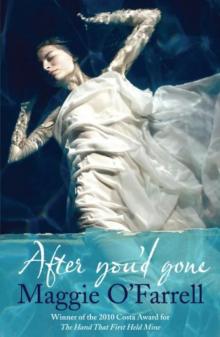 After You'd Gone
After You'd Gone The Hand That First Held Mine
The Hand That First Held Mine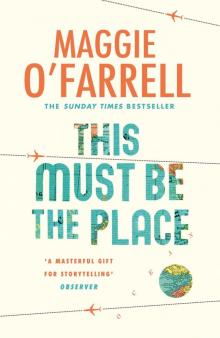 This Must Be the Place
This Must Be the Place My Lover's Lover
My Lover's Lover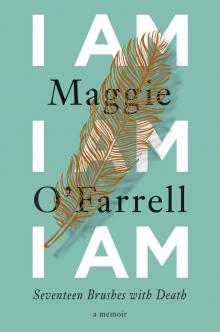 I Am, I Am, I Am: Seventeen Brushes With Death
I Am, I Am, I Am: Seventeen Brushes With Death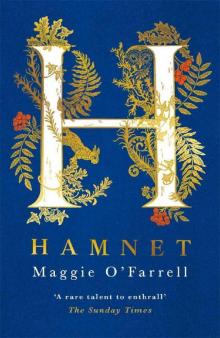 Hamnet
Hamnet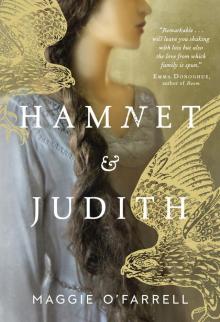 Hamnet and Judith
Hamnet and Judith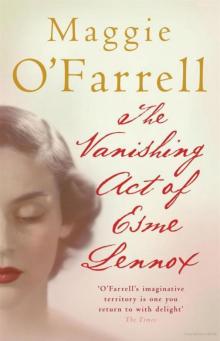 The Vanishing Act of Esme Lennox
The Vanishing Act of Esme Lennox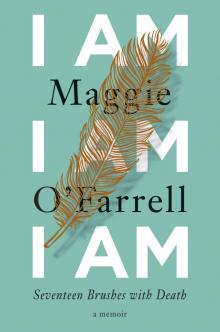 I Am, I Am, I Am
I Am, I Am, I Am